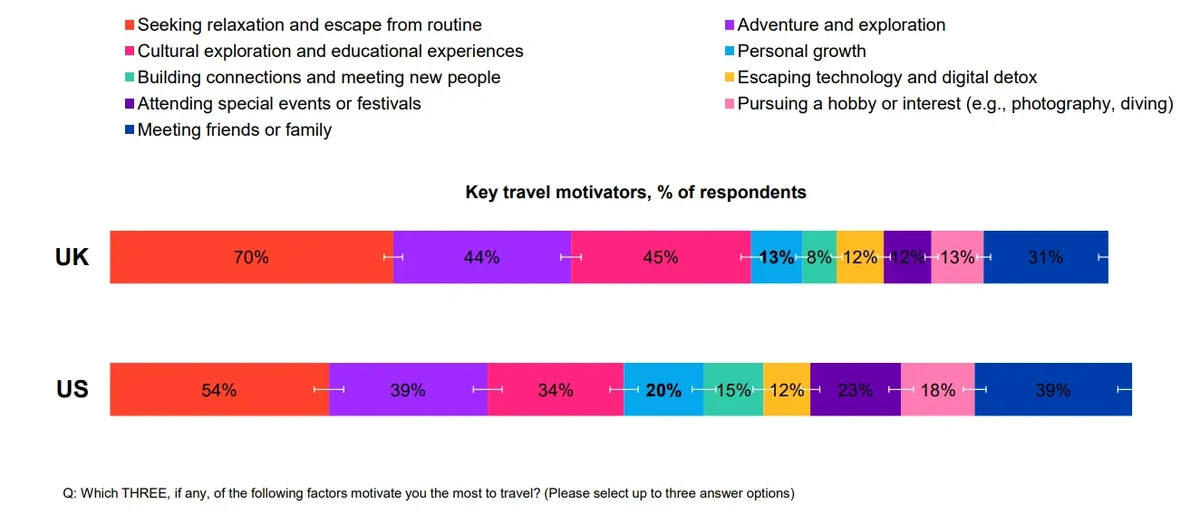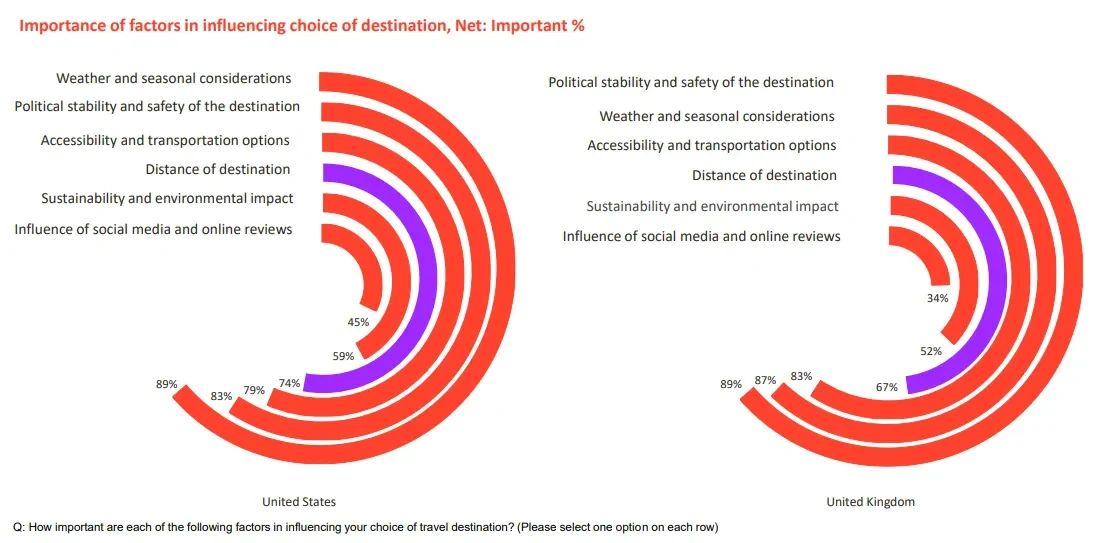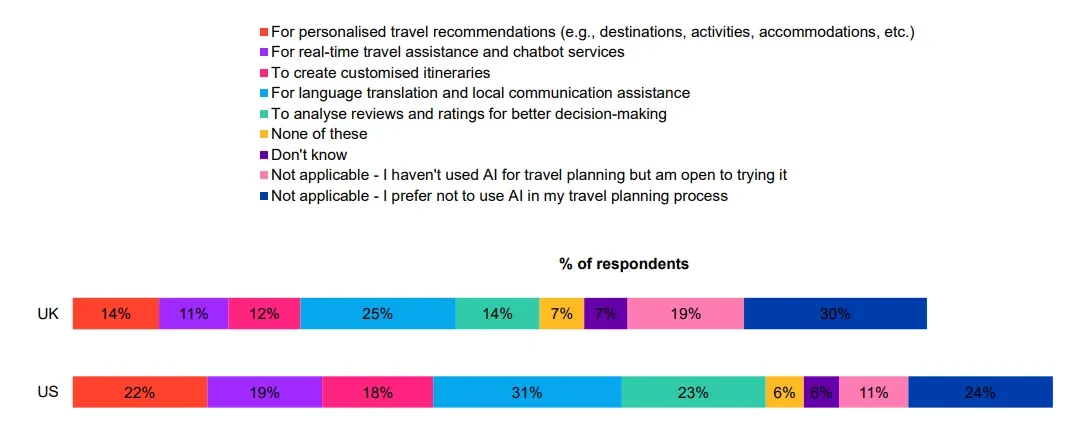
Understanding travel in the era of AI
In the lead up to summer travel, Eva Stewart, Global Sector Head for Travel & Tourism at YouGov, held a special travel webinar delving into what’s defining travel in 2024, joined by Nicholas Hall, founder of Digital Tourism Think Tank.
This includes:
- What motivates British and American travelers to pack their bags
- What unique travel experiences excite travelers in both markets
- Is AI helping them plan their trips
What inspires travelers in 2024?
In 2024 the quest for personal enrichment stands at the forefront of travel. Here are some of the top travel themes for this year:
- Relaxation and escape (70% of UK and 54% of US travelers).
- Adventure and exploration (44% of UK and 39% of US travelers)
- Cultural immersion with educational experiences (45% of UK and 34% of US travelers)
- Connecting with friends and family (31% of UK and 39% of US travelers)
- Pursuing a hobby (13% of UK and 18% of US travelers)
- Attending events (12% of UK and 23% of US travelers)

This trend is further amplified when we look at age groups. Younger US travelers (25-34) crave adventure (47%) and culinary experiences (43%), with interests shifting towards eco-conscious travel when we look at consumers aged 35-44 (27%).
On this topic, Eva Stewart says, “This progression suggests that as people age their travel preferences move on from seeking thrilling enjoyment towards more enriching and sustainable experiences. Understanding these shifting motivators can help the travel industry tailor their marketing strategies and product offerings to meet the changing needs and preferences at different life stages.”
Younger travelers in the UK are increasingly mindful of their impact, opting for sustainable and impactful travel choices (44% of 18-34-year-olds). The research indicates that younger generations are not just looking to broaden their horizons, they seem to be mindful of the footprint they leave on the destinations they explore.
The quest for unique experiences
British travelers display a greater willingness to venture further afield (67%), suggesting that they may be more inclined to seek out their desired experiences. Further indicating that safety (89%) and good connection to the destination (83%) are also important factors.
Social media and online reviews (45%) also sway the decisions of American travelers. “That links to what we see that social proof, community validation is shaping travel decisions particularly in the context of experience-based travel,” says Eva. “For American travelers the decision-making process is heavily influenced by the perceived experiences of others as showcased on social media platforms. This reliance on social media not only informs their choices but also steers them towards destinations that are endorsed for delivering exceptional and photogenic experiences.”

AI: A potential travel companion
Artificial intelligence is revolutionizing many industries, and travel is no exception. Interestingly, only one in ten British and American travelers seek a complete digital detox on their trips. In contrast, 42% are integrating or open to using AI in their travel planning.
Our data shows that 42% of travelers have either already welcomed AI into their travel plans or are curious enough to give it a try. Another 16% haven’t used AI but are interested. Meanwhile 28% of travelers steer clear of AI relying on more traditional methods to plan their trips.
Diving into AI tools that travelers are reaching for when planning their trips reveals that language translation assistance takes the top spot (25% Brits and 31% Americans). Personalized recommendations (14% Brits and 22% Americans) and reviews and ratings (14% Brits and 23% Americans) follow close behind.
A similar share of travelers in both markets also looks for customized itineraries, catering to their unique travel styles and interests (12% and 18% respectively).
A significant share of travelers leans towards real-time assistance and chatbot services (11% and 19%).

Younger generations are at the forefront of adopting AI in travel for one-of-a-kind experiences while older generations are cautiously accepting the new technology for more efficient planning.
The UK's younger demographic shows interest in AI's potential, but overall adoption lags behind the US, suggesting a more gradual shift towards mainstream acceptance.
Human connection remains a key factor in travel decisions
Despite the rise of AI, travelers still want a degree of human interaction. Even those open to, or already using, AI rely heavily on the opinions of others: 51% seek recommendations from friends and family, while 43% trust online forums and reviews. This highlights the importance of personal recommendations and shared experiences in travel decision-making.
Social media further fuels the reliance on external insights (46%), whereas traditional channels like travel newsletters (20%), agent and tour operators (24%) show that a small share of travelers still prefer a curated approach.
It’s clear that while tech has changed the map, personal connection and trusted sources continue to guide the way.
Watch the YouGov's latest travel webinar to learn more about:
- What services and amenities Americans and Brits look for in their travel accommodations
- How comfortable are American and British travelers with using AI
- How different types of travelers prefer to use AI
- What travelers expect from travel websites and apps that use AI
Image: Getty Images